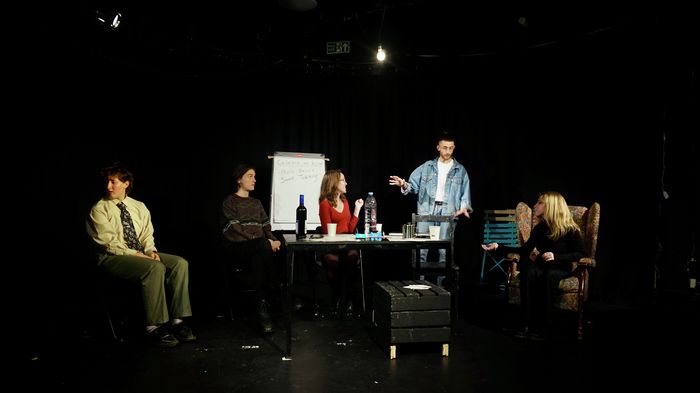A Long Apprenticehood but a promising career
Martha Vine sits down with writer Eve Connor and director Jennifer Chen to discuss the ease of graduating their “cosy” two-person production.

“I guess I was worried about the distance,” replies Eve Connor when I ask about her choice of location for her first full-length play. A Long Apprenticehood is fundamentally concerned with distance though – the intimacy of a two-person cast, new starts in a distant country, and the at once symbiotic bond yet also unbridgeable distance between two siblings are the animating forces of a production which centres itself around the notion of homes new and old. Pembroke Cellars, small and intimate, is an excellent choice then. Director Jennifer Chen wants to ensure the actors will be “in your face” all the time, imbibing the audience with a sense that they could “reach out and touch them.” “It’s cosy,” she says of its underground location, “but also suffocating.” Perfect for a play that strips its characters to the emotional bone before our eyes.
“A lot of the production has felt like growth”
Despite Connor’s research – she details to me how her Irish heritage led her to sift into materials of the Anglo-Irish Treaty, finding her footing in the past she wanted to illustrate – this play is anchored more to the universal human experience of longing than it is to the facts of history. Moving away from home, missing family, missing the ease of childhood; these are the realities for almost everyone upon arriving at university, and these are the feelings that charge her script with an emotional immediacy that her leading actress stated made her lines “instinctual” to learn. “I never specified a date, exactly,” Connor says of her play’s ambiguous setting. More relatable? I suggest, and she agrees: “having to reconcile leaving somewhere with finding somewhere… I get to use a historical setting to understand a lot of the things we’re going through now.” Last week, she tells me, she found herself referring to the flat she’s recently moved into as ‘home’ and I laugh, agreeing over the strangeness of calling our single-bed and desk existences ‘home’ for a year, only to relinquish it to a stranger the next.
The compact cast and crew has been integral in enabling Connor and Chen to sink their teeth into this shifting dynamic of foreignness and familiarity: “a lot of the production has felt like growth,” Chen tells me when I question how the often doubled-up production members have impacted the rehearsal atmosphere. They “get to go into depth,” tease out the narrative and unravel it in a way that a larger team often does not allow. It helps that most of the students involved are new to the Cambridge theatre scene, often learning on the job: “everyone has something to do, always,” Chen says with a smile far cheerier than I would expect the admission of busyness to inspire. But this is a play with no dead weight, and one that apparently feels surprisingly easy to realise despite the chaos of the Cambridge term.
“This is a play assured in its own execution, that trusts in the power of what it is trying to say”
Easy is a word which keeps cropping up throughout our conversation. The script? Easy to work with, despite its meatiness. The cast? Easily embodying that potentially tricky-to-execute sibling dynamic. Rehearsals, especially in the early stages, would involve the team sitting on a sofa to discuss how the script felt to them before running it through in a few different ways, seeing which approach came most intuitively. Before each run-through, they “mind-meld” (a word-association warm-up exercise that I had never heard of) and “do the funky chicken” – nothing to do with chickens, regrettably, but prompting actors to settle into a comfortable body language. Considering Chen uses the metaphor of “birthing a baby” to describe the process of bringing a play into fruition, it seems like this has been a remarkably smooth pregnancy.
I’m unfamiliar with Cambridge theatre being anything other than wonderfully frenzied, but, standing at the cusp of a five night run, Connor and Chen are exuding nothing but quietly assured confidence. “I thought you might be more frantic,” I tell them, to which Connor shrugs. “There’s just something that happens when the lights go on” – the background noise of timetabling stresses and lighting anxieties all fades away. This is a play assured in its own execution, that trusts in the power of what it is trying to say and knows that its message is one each audience member will want to hear. As we finish our conversation and I get ready to venture back out into the autumn darkness, I ask, almost as an afterthought as I grab my bag, what they’re most excited for in the upcoming days. Connor smiles up at me: “it never really gets old, hearing people say your words.”
 Arts / Plays and playing truant: Stephen Fry’s Cambridge25 April 2025
Arts / Plays and playing truant: Stephen Fry’s Cambridge25 April 2025 News / Candidates clash over Chancellorship25 April 2025
News / Candidates clash over Chancellorship25 April 2025 Music / The pipes are calling: the life of a Cambridge Organ Scholar25 April 2025
Music / The pipes are calling: the life of a Cambridge Organ Scholar25 April 2025 Comment / Cambridge builds up the housing crisis25 April 2025
Comment / Cambridge builds up the housing crisis25 April 2025 News / Cambridge Union to host Charlie Kirk and Katie Price28 April 2025
News / Cambridge Union to host Charlie Kirk and Katie Price28 April 2025





